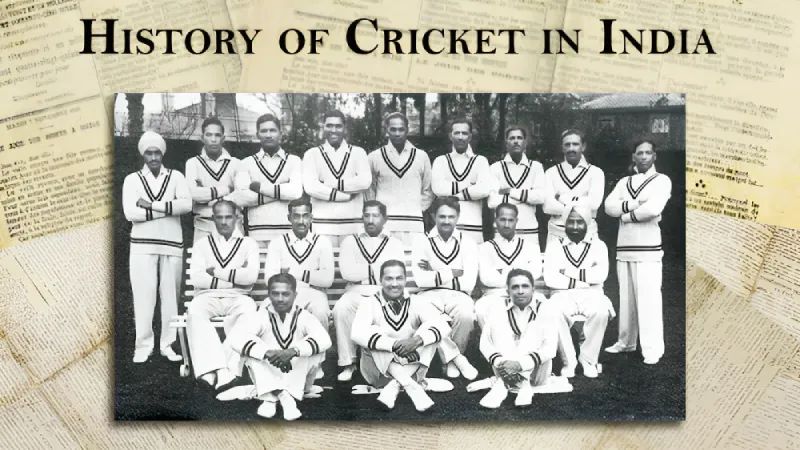The history of Indian cricket is a journey from modest beginnings to becoming one of the most dominant and celebrated cricketing nations in the world. Here’s a detailed overview:

1. Early Beginnings (18th and 19th Century)
- Introduction of Cricket in India:
- Cricket was introduced to India by the British in the early 1700s, primarily played by sailors and colonial officials in coastal cities like Bombay (now Mumbai), Madras (now Chennai), and Calcutta (now Kolkata).
- The Parsis, a community of Zoroastrians in Mumbai, were the first Indians to adopt cricket. In 1848, they formed the first Indian cricket club, the Oriental Cricket Club.
- First Matches Against British Teams:
- In 1877, the Parsis played matches against European teams in Bombay, marking the beginning of competitive cricket in India.
2. Formation of Domestic Cricket
- Bombay Quadrangular Tournament (1912):
- Initially known as the Bombay Triangular, it involved teams based on communities: Europeans, Parsis, Hindus, and later Muslims.
- This tournament played a significant role in popularizing cricket in India.
- Ranji Trophy (1934):
- Named after the famous Indian cricketer Ranjitsinhji, the Ranji Trophy became India’s premier domestic cricket competition.
- It provided a platform for Indian players to hone their skills and gain recognition.
3. India’s First Steps in International Cricket
- First Test Match (1932):
- India played its first Test match against England at Lord’s in London in 1932. The team was captained by CK Nayudu, considered India’s first cricketing superstar.
- Though India lost the match, it marked the country’s entry into the international cricketing arena.
- Pre-Independence Era:
- Indian cricket saw gradual improvement during this period, with players like Lala Amarnath, who became the first Indian to score a Test century in 1933.
4. Post-Independence Era (1947–1970s)
- Formation of the Board of Control for Cricket in India (BCCI):
- The BCCI was formed in 1928, but post-independence, it gained prominence as the governing body for Indian cricket.
- First Test Victory (1952):
- India registered its first-ever Test victory against England in Chennai. The team was led by Vijay Hazare.
- The same year, India also achieved its first series win against Pakistan.
- The Spin Quartet (1960s–70s):
- The emergence of the famous spin quartet — Bishan Singh Bedi, Erapalli Prasanna, BS Chandrasekhar, and S. Venkataraghavan — made India a formidable team in home conditions.
5. The Kapil Dev Era (1980s)
- Rise of Kapil Dev:
- Kapil Dev, a charismatic all-rounder, brought a new dimension to Indian cricket with his aggressive batting, lethal bowling, and inspiring captaincy.
- 1983 Cricket World Cup Victory:
- India stunned the cricketing world by winning the 1983 ICC Cricket World Cup under Kapil Dev’s captaincy, defeating the mighty West Indies in the final at Lord’s.
- This victory transformed Indian cricket, igniting mass popularity and inspiring a new generation of cricketers.
- Ravi Shastri and the 1985 World Championship of Cricket:
- India won the World Championship of Cricket in Australia in 1985, further cementing its status as a major cricketing power.
6. The Sachin Tendulkar Era (1990s)
- The Arrival of Sachin Tendulkar:
- Tendulkar, who debuted in 1989, became one of the greatest cricketers in history, earning the nickname “The Little Master.”
- His extraordinary batting feats made him a national hero and a global icon.
- Rise of Limited-Overs Cricket:
- The 1990s saw a boom in ODI cricket, with players like Tendulkar, Sourav Ganguly, Rahul Dravid, and Anil Kumble leading the charge.
- India hosted the 1996 Cricket World Cup, further boosting the sport’s popularity.
- Match-Fixing Scandal (2000):
- The late 1990s and early 2000s were marred by a match-fixing scandal, involving some Indian cricketers, which shook the sport’s credibility.
7. The MS Dhoni Era (2000s–2010s)
- Emergence of MS Dhoni:
- Dhoni brought unprecedented success as captain, known for his calm demeanor and exceptional leadership.
- 2007 ICC T20 World Cup Victory:
- India won the inaugural T20 World Cup in 2007 under Dhoni, introducing a new format to Indian fans and establishing India as a force in T20 cricket.
- 2011 ICC Cricket World Cup Victory:
- India lifted the 2011 ICC World Cup, ending a 28-year drought. Dhoni’s iconic six in the final against Sri Lanka remains one of cricket’s most memorable moments.
- Rise of Virat Kohli:
- Kohli emerged as a dominant batsman and captain during this era, taking Indian cricket to new heights in all formats.
8. Modern Indian Cricket (2010s–Present)
- Dominance in Test Cricket:
- India became the No. 1 ranked Test team under Kohli’s leadership, achieving historic wins overseas, including series victories in Australia.
- Indian Premier League (IPL):
- Launched in 2008, the IPL revolutionized cricket with its fast-paced T20 format, massive viewership, and financial success.
- It became the most popular cricket league globally, attracting top international players.
- Women’s Cricket in India:
- Women’s cricket gained prominence with stellar performances in ICC events, including reaching the final of the 2017 Women’s World Cup and the 2020 T20 World Cup.
- Players like Mithali Raj, Jhulan Goswami, and Smriti Mandhana have become household names.
- 2023 ICC Cricket World Cup Victory:
- India won the 2023 ODI World Cup, hosted in India, under the leadership of Rohit Sharma, solidifying its status as a cricketing powerhouse.
9. Legacy and Impact
- Cultural Significance:
- Cricket is more than a sport in India; it’s a religion that unites people across regions, languages, and religions.
- Economic Impact:
- Indian cricket generates billions of dollars annually, with the BCCI being one of the wealthiest cricket boards globally.
- Future Prospects:
- With a strong domestic system, exciting young talent, and continued global influence, Indian cricket is poised to dominate the sport for years to come.
 Indian Sports News | B2H2
Indian Sports News | B2H2